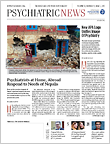Previous analyses have shown that positive outcomes—results displaying the benefits and effectiveness of a drug—from randomized, clinical trials are more likely to be published than negative or nonsignificant results. Researchers at the Oregon Health and Science University (OHSU) have now concluded that such bias reporting holds true for trials involving commonly used antidepressant medication in treating anxiety disorders.
Erick Turner, M.D., an associate professor of psychiatry at OHSU School of Medicine, and colleagues conducted a study to examine reporting bias in the scientific literature on the efficacy of second-generation antidepressants approved by the Food and Drug Administration (FDA) for the treatment of anxiety disorders.
“The peer-review process of publication allows, perhaps even encourages, this kind of thing [publication bias] to happen,” Turner stated in a press release. “And this isn’t restricted to psychiatry. Reporting bias has been found throughout the medical and scientific literature.”
The researchers noted that different types of reporting biases are common across clinical trials. These included study publication bias, which occurs when studies with positive results are more likely to be published than studies with negative results; outcome reporting bias, which occurs when positive outcomes resulting from use of a medication are emphasized over negative outcomes resulting from the same medication; and spin reporting, which occurs when treatments are described by investigators as beneficial, even though published results for primary outcomes are nonsignificant.
Coauthor Craig Williams, Pharm.D., an associate professor of pharmacy at the OHSU College of Pharmacy, said that many FDA-approved antidepressants are fairly safe and well tolerated. However, he added, “there is less evidence for [the] value of these drugs than published studies would have you believe. And these concerns are increased when such medications are frequently prescribed by general practitioners with less training in psychiatry.”
In the current study, the researchers performed a systematic review of findings from premarket clinical trials that had been presented to the FDA for the approval of second-generation antidepressants in treating various forms of anxiety disorders, including posttraumatic stress disorder, obsessive-compulsive disorder, and panic disorder. Second-generation antidepressants included seven selective serotonin reuptake inhibitors and two selective serotonin norepinephrine reuptake inhibitors.
The results, published online in JAMA Psychiatry on March 25, showed that 41 of the 57 trials analyzed were considered to have positive outcomes by the FDA. Drug trials that the FDA deemed as producing positive outcomes were five times more likely to be published in agreement with the FDA analysis than those trials with negative outcomes—an indication of publication-reporting bias. The OHSU researchers also observed that 19 percent of the clinical trials deemphasized negative data over positive data (outcome reporting), and another 19 percent of clinical studies claimed drugs had significant benefits in improving symptoms of anxiety when statistical analyses stated otherwise (spin reporting).
“These findings mirror what we found previously with the same drugs when used to treat major depression and with antipsychotics,” said Turner. “When studies don’t turn out well, you usually will not know it from the peer-reviewed literature.”
The study noted that some researchers and pharmaceutical companies might feel the need to manipulate and exaggerate results because positive results receive more scientific attention, are published sooner, and often lead to higher drug sales. Such biases may affect the prescription behaviors of physicians who have been misinformed by such findings.
The researchers noted that physicians could gain a more realistic view of the evidence for the efficacy of antidepressants in the short-term treatment of anxiety disorders from the results of the current study and those that compare published data with data submitted to the FDA and other agencies.
The study was funded by the Dutch Brain Foundation. ■
An abstract of “Reporting Bias in Clinical Trials Investigating the Efficacy of Second-Generation Antidepressants in the Treatment of Anxiety Disorders” can be accessed
here.
